

Development Aid Confronts Politics: The Almost Revolution by Thomas Carothers and Diane de Gramont. After decades of denial, the development community now acknowledges that effective assistance requires grappling with the domestic politics of recipient countries.

Yet considerable controversy and confusion accompany this potential revolution in development aid, the subject covered in Development Aid Confronts Politics: The Almost Revolution. Africa in Transition » Guest Post: ICT, Africa, and the 90/10 Rule. A technician repairs cell phones in his store in Khartoum December 21, 2011.
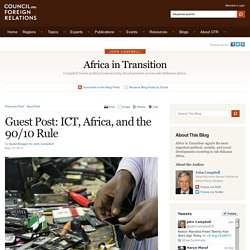
(Mohamed Nureldin Abdallah/Courtesy Reuters) Asch Harwood is the Africa program research associate at the Council on Foreign Relations. Last week, SAIS hosted a conference on information and communication technology (ICT) and political participation in Africa. Participants explored the potential of ICT to improve governance in Africa by promoting dissent, organizing opposition, enabling large groups to express shared concerns, and reducing communication transaction costs; as well as improving government effectiveness by streamlining administrative functions (bureaucratic listservs or mobile courts for example), opening channels of communication with constituents, and improving service delivery. Turns out it’s not. As speakers as well as audience questions attested to, it is easy to get caught up in the ICT component of a project and allow it to overshadow the desired outcomes.
This isn’t all that surprising. Thinking Politically about Social Accountability. There has been some great new work out on social accountability (SA), an increasingly significant area of development funding for governance work.
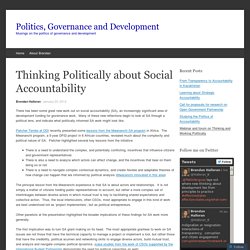
Many of these new reflections begin to look at SA through a political lens, and indicate what politically informed SA work might look like. Fletcher Tembo at ODI recently presented some lessons from the Mwananchi SA program in Africa. The Mwananchi program, a 5-year DFID project in 6 African countries, revealed much about the complexity and political nature of SA. Fletcher highlighted several key lessons from the initiative: The principal lesson from the Mwananchi experience is that SA is about actors and relationships. Other panelists at the presentation highlighted the broader implications of these findings for SA work more generally. The first implication was to turn SA grant making on its head.
Second, this puts another nail in the coffin of ‘tool-based’ approaches to SA (citizens report cards, etc.). Is It Time for a New Paradigm for "Citizen Engagement"? The Role of Context and What the Evidence Tells Us. The meteoric rise of "citizen engagement" Almost all development agencies promote some form of citizen engagement and accountability, often framed as 'voice', 'demand-side governance', 'demand for good governance' or 'social accountability'.
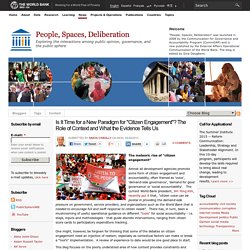
The current World Bank president, Jim Yong Kim, recently put it that, "citizen voice can be pivotal in providing the demand-side pressure on government, service providers, and organizations such as the World Bank that is needed to encourage full and swift response to citizen needs". Latest Network and Community topics - Open Knowledge Forums. What are the limits of transparency and technology? From three gurus of the openness movement (Eigen, Rajani, McGee) Making ICTs work for social justice and development. The World Wide Web, by the Numbers - Megan Garber. The founder of the web checks in on his creation, with mixed results.
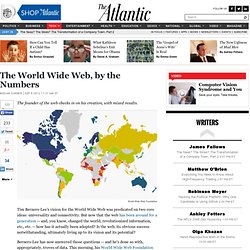
World Wide Web Foundation Tim Berners-Lee's vision for the World Wide Web was predicated on two core ideas: universality and connectivity. But now that the web has been around for a generation -- and, you know, changed the world, revolutionized information, etc., etc. -- how has it actually been adopted? Is the web, its obvious success notwithstanding, ultimately living up to its vision and its potential? Future - Technology - How technology democratised development. Over the coming weeks, A Matter of Life and Tech will feature a range of voices from people helping to build Africa’s tech future. This week, mobile innovator Ken Banks argues that technology has become a vital tool in the fight against poverty. Twenty years ago, if you were information technology-literate and interested in international development, your options were limited. That’s how things were for me when, in 1993, armed with ten years programming and networking experience I began turning my attention to the developing world.
My efforts didn’t get me far. The information technology revolution we see today had barely started at home, let alone in many of the developing nations. How things have changed. The irony today is that arguably the greatest developmental tool we have in our hands isn’t a product of the tens of billons of developmental aid spent over the years, but a by-product of private sector investment.
Everyday innovation They’re also their banks. ICTs to transform health in Africa: Can we scale up governance and accountability ? Start-up eHealth innovations are popping up all over Africa, providing a glimpse of how ICTs can transform the delivery and governance of health services in the region.
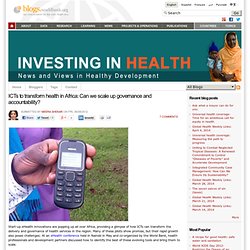
Many of these pilots show promise, but their rapid growth also poses challenges: At an eHealth conference held in Nairobi in May and co-organized by the World Bank, health professionals and development partners discussed how to identify the best of these evolving tools and bring them to scale. Uganda is one example of a country where eHealth start-ups have developed quickly . One innovation, a simple text message-based application, can be used in a health center to report when lifesaving drugs are not available. Not only does the application improve availability of drugs, it also improves transparency and accountability by ensuring that patients and clients can report drug stock-outs directly without having to go through health workers.
What’s the connection between power, development and social media? 12271304441Open_ICT4D_Draft.pdf (application/pdf Object) Di_wp36.pdf (application/pdf Object) Itdj.20095 (application/pdf Object) New Marxian Times! Reflections on the 4th ICTs and Society Conference “Critique, Democracy and Philosophy in 21st Century Information Society. Towards Critical Theories of Social Media”. New Marxian Times!
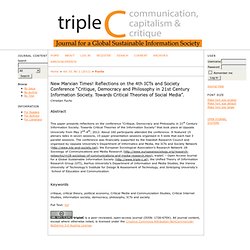
Reflections on the 4th ICTs and Society Conference “Critique, Democracy and Philosophy in 21st Century Information Society. Towards Critical Theories of Social Media”. Abstract This paper presents reflections on the conference “Critique, Democracy and Philosophy in 21st Century Information Society. Towards Critical Theories of the Information Society” that took place at Uppsala University from May 2nd-4th, 2012. Keywords.
Open Development Debate. Discourse. Communication is Aid. Global Health, Farming, Education or Climate Change: What Would Apple Do? What if we took an Apple approach to solving the world’s environment and development problems?
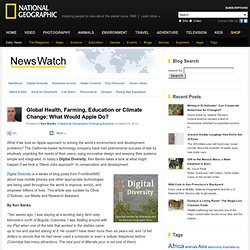
The California-based technology company have had phenomenal success of late by intuitively unpicking the needs of their users, using innovative design and keeping their systems simple and integrated. The Social Side of ICT4D. We all know that technology helps shape the way we work, learn, interact, and behave.
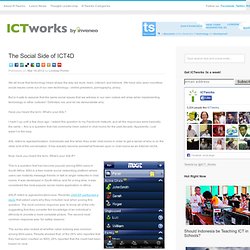
We have also seen countless social issues come out of our own technology –online predators, pornography, piracy. But is it safe to assume that the same social issues that we witness in our own culture will arise when implementing technology in other cultures? Definitely not, and let me demonstrate why: Have you heard the term, What’s your ASL? I hadn’t up until a few days ago. ASL refers to age/sex/location.
ICT4D in Africa Group News. Video_in_Development.pdf (application/pdf Object) CommGAP1.pdf (application/pdf Object) The_new_communicator.pdf (application/pdf Object) 43602651.pdf (application/pdf Object) New / social media. Tools. Mobile.